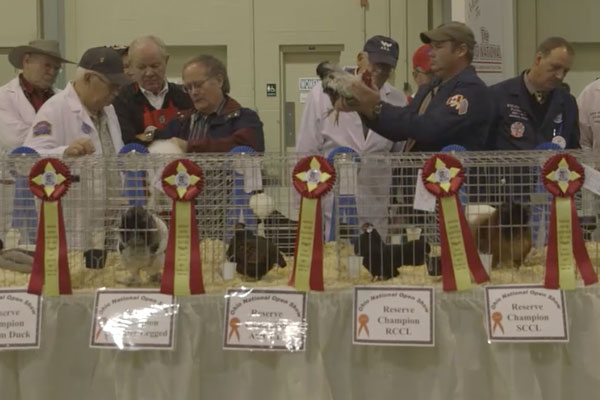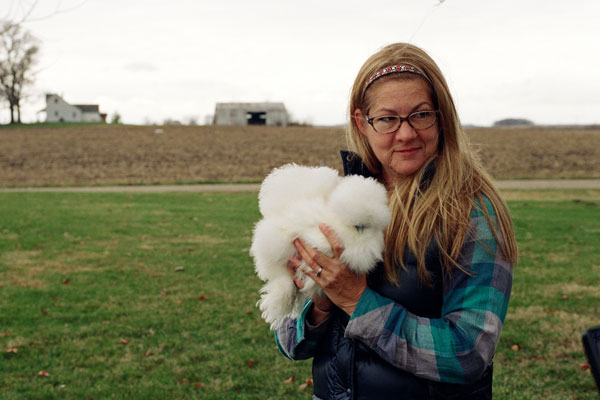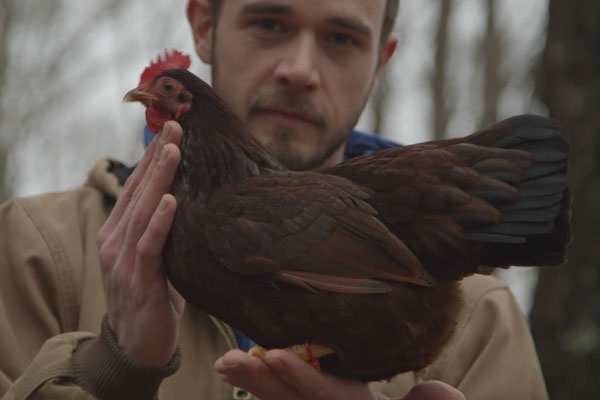Welcome to the Wacky, Sometimes Wild, but Always Fascinating World of “Chicken People”
The world of show chickens makes child beauty pageants look like a cakewalk.
Welcome to the Wacky, Sometimes Wild, but Always Fascinating World of “Chicken People”
The world of show chickens makes child beauty pageants look like a cakewalk.

Helicoptering beauty pageant parents may seem tame when compared to the breeders of show chickens, who spend countless hours in pursuit of the perfect example of their chosen breed – from Silkies, which sort of resemble alpacas more than poultry, to the Modern Game fowl, whose long muscular legs seem to hark back to its dinosaur ancestors. Show chicken breeders rely on a book that’s more than 100 years old, The American Standard of Perfection, to determine if their bird has the perfect comb curl, color, or tail length. For some, raising show chickens is about problem solving. For others, it’s about communing with nature, or even as a way to heal from adversity.
A new feature-length documentary from CMT and Motto Pictures, Chicken People – airing on CMT later this year – takes us deep into this world as it follows three breeders of show poultry: Brian Caraker, a young singer and dancer whose love for his chickens is sometimes at odds with his career; Shari McCollough, a homemaker from Indiana who spends her boundless energy on breeding and grooming several breeds, especially her prized Silkes; and Brian Knox, an engineer who makes his living designing drag racing engines and approaches chicken breeding with a similar mindset.
The film opens at the 2014 Ohio National Poultry show and viewers follow along throughout the next year as the three work to create the perfect chicken – amidst the worst avian flu epidemic in U.S. history – that they’ll bring to the next big competition. Chicken People premiered at this year’s South by Southwest Film Festival in Austin, and will be at the Nashville Film Festival April 23.
We spoke with the film’s Emmy-nominated director and executive producer, Nicole Lucas Haimes, about what it was like to make Chicken People, and how the experience changed her views on poultry.
As I spent time with the subjects I found that raising chickens helped them to become the best versions of themselves.
Modern Farmer: How did you become interested in the world of show chickens?
Nicole Lucas Haimes: I have two sons. My oldest, Lucas, is now 16. When he was 11 there was a fad at his elementary school where the kids were really, really into chickens so I bought him a book, Extraordinary Chickens [by Stephen Green-Armytage]. We were going through it together, and the book mentioned that people breed competition show chickens. I thought it was so cool. I knew I had to make a film.
MF: With all the mockumentaries out there – Best in Show, for example – were you sensitive about making sure that you presented the subjects in a way that didn’t seem exploitative?
NLH: It was my paramount concern. I wanted it to be lovingly told. Having a camera is a powerful thing. I am the kind of filmmaker who wants to find the most compassionate view of my subjects. I felt especially for Chicken People that I wanted it to be fun, funny, entertaining, but also a celebration of the human spirit. As I spent time with the subjects I found that raising chickens helped them to become the best versions of themselves. That became the story to tell. The depth of their passion was unexpected. It was an education, and a discovery as we went deeper and deeper into the movie.


MF: The 2015 Ohio National Poultry Show was cancelled due to the avian flu epidemic, and you were planning to shoot there. When you found out, what was going through your mind?
NLH: I was pretty devastated. I knew that a lot of people were suffering, but I was suffering too! I thought the movie was over. No one knew what was going to happen. Ohio was shut down, all of these other states were shutting down, and the shows that were still taking place started requiring avian flu testing, which was cost prohibitive for a lot of people. I was very, very concerned about how we would finish the movie. Then we found out that the Dixie Classic Poultry Show in Knoxville, Tennessee was open, and that they were willing to let us film there, but it wasn’t clear whether our competitors were going to be able to get there. [Editors’ note: They did, and Haimes included footage from this show in the film.]
MF: What were some of the most surprising things you learned about chickens while making the film?
NLH: I learned how smart chickens are. I’ve seen them go through obstacle courses and solve problems. I could not believe how magical watching a chicken hatch is. They work so hard to get out of the egg. It’s a really long process. We sat there with our camera for hours waiting for the chicks to hatch. They start peeping, then begin to move about inside the egg before forcing their little bodies out of the shell. The range and beauty of chickens was amazing to me. I gained a lot of respect for the lowly chicken.

MF: After spending so much time around show chickens did it make you think twice about what you eat?
NLH: I don’t eat a lot of meat. Every once in awhile I’ll have pizza with sausage or a bite of one of my kid’s hamburgers, but since making this film I have not eaten chicken. Not even once. I’m done. There will be no more eating chicken.
MF: Did making this film give you any desire to raise chickens?
Yes! At one of the shows I was holding a Polish rooster. This breed looks a bit like David Bowie from his Ziggy Stardust phase. I took a picture and sent it to my husband. I didn’t even ask him, “should we get one?” but he wrote back, “don’t you dare!” I live in Venice, California. It’s pretty urban, and we really don’t have the room for chickens. But if we were ever to leave LA I would definitely get chickens.
Watch a clip from Chicken People below:
Follow us
This work is licensed under a Creative Commons Attribution-NoDerivatives 4.0 International License.
Want to republish a Modern Farmer story?
We are happy for Modern Farmer stories to be shared, and encourage you to republish our articles for your audience. When doing so, we ask that you follow these guidelines:
Please credit us and our writers
For the author byline, please use “Author Name, Modern Farmer.” At the top of our stories, if on the web, please include this text and link: “This story was originally published by Modern Farmer.”
Please make sure to include a link back to either our home page or the article URL.
At the bottom of the story, please include the following text:
“Modern Farmer is a nonprofit initiative dedicated to raising awareness and catalyzing action at the intersection of food, agriculture, and society. Read more at <link>Modern Farmer</link>.”
Use our widget
We’d like to be able to track our stories, so we ask that if you republish our content, you do so using our widget (located on the left hand side of the article). The HTML code has a built-in tracker that tells us the data and domain where the story was published, as well as view counts.
Check the image requirements
It’s your responsibility to confirm you're licensed to republish images in our articles. Some images, such as those from commercial providers, don't allow their images to be republished without permission or payment. Copyright terms are generally listed in the image caption and attribution. You are welcome to omit our images or substitute with your own. Charts and interactive graphics follow the same rules.
Don’t change too much. Or, ask us first.
Articles must be republished in their entirety. It’s okay to change references to time (“today” to “yesterday”) or location (“Iowa City, IA” to “here”). But please keep everything else the same.
If you feel strongly that a more material edit needs to be made, get in touch with us at [email protected]. We’re happy to discuss it with the original author, but we must have prior approval for changes before publication.
Special cases
Extracts. You may run the first few lines or paragraphs of the article and then say: “Read the full article at Modern Farmer” with a link back to the original article.
Quotes. You may quote authors provided you include a link back to the article URL.
Translations. These require writer approval. To inquire about translation of a Modern Farmer article, contact us at [email protected]
Signed consent / copyright release forms. These are not required, provided you are following these guidelines.
Print. Articles can be republished in print under these same rules, with the exception that you do not need to include the links.
Tag us
When sharing the story on social media, please tag us using the following: - Twitter (@ModFarm) - Facebook (@ModernFarmerMedia) - Instagram (@modfarm)
Use our content respectfully
Modern Farmer is a nonprofit and as such we share our content for free and in good faith in order to reach new audiences. Respectfully,
No selling ads against our stories. It’s okay to put our stories on pages with ads.
Don’t republish our material wholesale, or automatically; you need to select stories to be republished individually.
You have no rights to sell, license, syndicate, or otherwise represent yourself as the authorized owner of our material to any third parties. This means that you cannot actively publish or submit our work for syndication to third party platforms or apps like Apple News or Google News. We understand that publishers cannot fully control when certain third parties automatically summarize or crawl content from publishers’ own sites.
Keep in touch
We want to hear from you if you love Modern Farmer content, have a collaboration idea, or anything else to share. As a nonprofit outlet, we work in service of our community and are always open to comments, feedback, and ideas. Contact us at [email protected].by Andrew Amelinckx, Modern Farmer
April 18, 2016
Modern Farmer Weekly
Solutions Hub
Innovations, ideas and inspiration. Actionable solutions for a resilient food system.
ExploreExplore other topics
Share With Us
We want to hear from Modern Farmer readers who have thoughtful commentary, actionable solutions, or helpful ideas to share.
SubmitNecessary cookies are absolutely essential for the website to function properly. This category only includes cookies that ensures basic functionalities and security features of the website. These cookies do not store any personal information.
Any cookies that may not be particularly necessary for the website to function and are used specifically to collect user personal data via analytics, ads, other embedded contents are termed as non-necessary cookies.